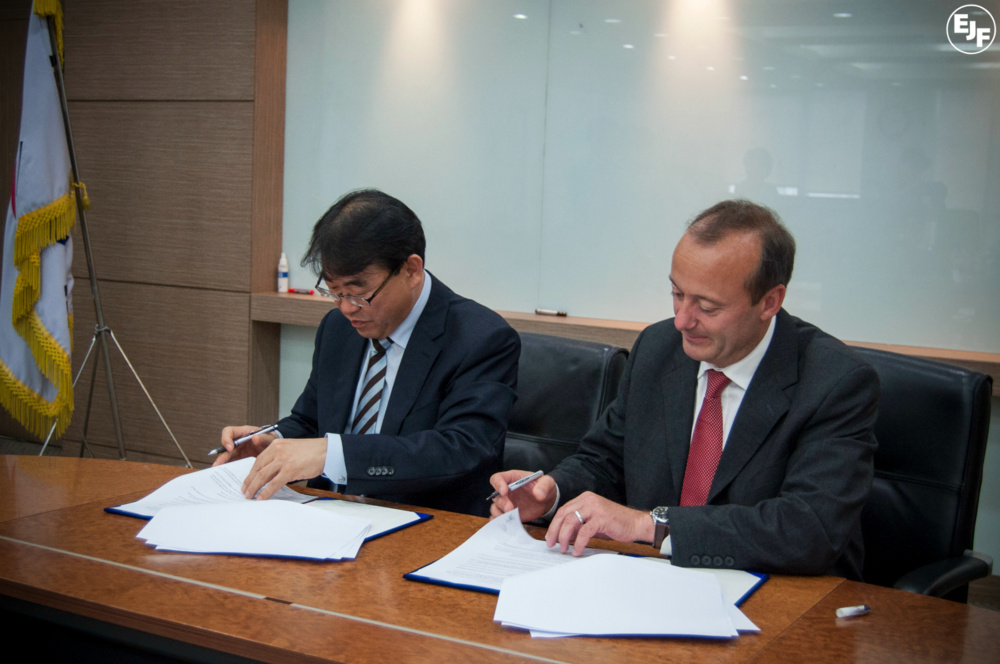
EU removes South Korea from list of those failing to combat pirate fishing
The European Commission today lifted the threat of trade sanctions against South Korea, removing their previous ‘yellow card’ warning to improve efforts in combating Illegal, Unreported, Unregulated (IUU) or ‘pirate’ fishing.
This delisting follows a series of measures taken by Korea to proactively prevent, deter and eradicate pirate fishing since the EU warning was issued in 2013.
From 2010 to early 2014, the Environmental Justice Foundation (EJF) documented a large number of Korean-flagged vessels operating illegally in West Africa, particularly in Sierra Leone where EJF operates a community surveillance project to report IUU fishing activities in the inshore areas reserved for local fishers. EJF’s evidence contributed to the 2013 decision by the European Union to warn Korea that it faced trade sanctions if it did not improve fisheries management.
Korea was encouraged to act by the EU’s IUU Regulation and the Ministry of Oceans and Fisheries signed a Memorandum of Understanding (MOU) with EJF in June 2014, committing to share information in order to tackle IUU fishing. In 2014 Korea amended its laws to significantly strengthen its Monitoring, Control and Surveillance (MCS) capacity and reinforced sanctions on IUU fishing activities. Korean fishing vessels are now required to carry Vessel Monitoring Systems (VMS), which allow satellites to track their movements. Korean officials monitor VMS from a 24-hour Fisheries Monitoring Centre that opened in May 2014. From September 2015, all vessels will be fitted with an electronic logbook system, which will allow vessels to share real-time information on catch and fishing operations.
Further amendments to Korea’s Distant Water Fisheries Development (DWFD) Act will come into force from 7 July 2015 will allow the confiscation of illegal fish found in Korean ports; the restriction of fishing authorisations; increased ability to act when Korean nationals engage in IUU fishing in waters outside Korea’s jurisdiction and tougher sanctions on serious infringements.
“Korea’s efforts to stop illegal fishing are unprecedented in the region and demonstrate a clear intent to deliver national and international leadership to combat IUU fishing which devastates marine environments, biodiversity, fish stocks, livelihoods and food security. Flag States need to maintain a firm grip on their distant water fleet, and we hope that other States will follow Korea’s lead. The actions taken by Korea since 2013 clearly demonstrate the global impact of the proactive steps taken by the EU and European Commission, through the EU IUU Regulation, to drive out pirate fishing from global supply chains. In the last 12 months Korea has taken huge strides away from poor performance to becoming a leading nation in the fight against IUU fishing with innovative and deterrent measures. The Korean industry, in particular Korean fishing vessel operators, must match the intention of their Government, make sure they abide by the law and become an exemplary distant-water fleet.” - Steve Trent, Executive Director of EJF
Some region-specific measures have also been adopted, such as in West Africa, a region particularly susceptible to IUU fishing. A large part of the Korean fleet that has been operating in West Africa will be bought by the Korean Government and scrapped, as part of a vessel de-commissioning programme worth 9.9 billion Korean Won (equivalent to $9 million USD or 7.8 million Euro). In an effort to improve transparency and combat corruption, the Korean Government will not allow private licensing in some West African countries, where fishing licences will instead be negotiated in the framework of bilateral agreements from Government to Government.
Background
Korea’s Distant Water Fisheries Development Act has been amended to increase the consistency with relevant international laws and regulations, such as the UN Fish Stocks Agreement. Major elements in the second amendment include:
- Stronger Control over IUU Vessels, including confiscation of illegal fish and fishing authorization restrictions in waters of a country without proper fisheries management and control systems.
- Stronger Control over Korean Nationals; a new provision was introduced to allow the Korean government to exercise control over Korean nationals who have engaged in IUU fishing in waters outside Korea’s jurisdiction.
- Stronger Monitoring, Control and Surveillance including installation of VMS on fish carriers and pre-authorization requirements for transhipment.
- Stronger Sanctions, including increased level of sanctions on serious infringements up to and including imprisonment.
Fishing activities of Korean-flagged vessels will be restricted in the following:
- Waters in which laws and regulations of coastal states prohibit fishing activities;
- Waters in which fishing authorization management system over foreign fishing vessels is ambiguous or insufficient;
- Waters whose relevant fisheries laws and regulations of coastal states are unknown or it is unclear whether such laws and regulations exist or not;
- Waters in which safe fishing by Korean-flagged vessels cannot be ensured; and
- Waters in which inefficient control over Korean-flagged fishing vessels may damage Korea’s national interest.
SIGN UP FOR OUR EMAILS AND STAY UP TO DATE WITH EJF